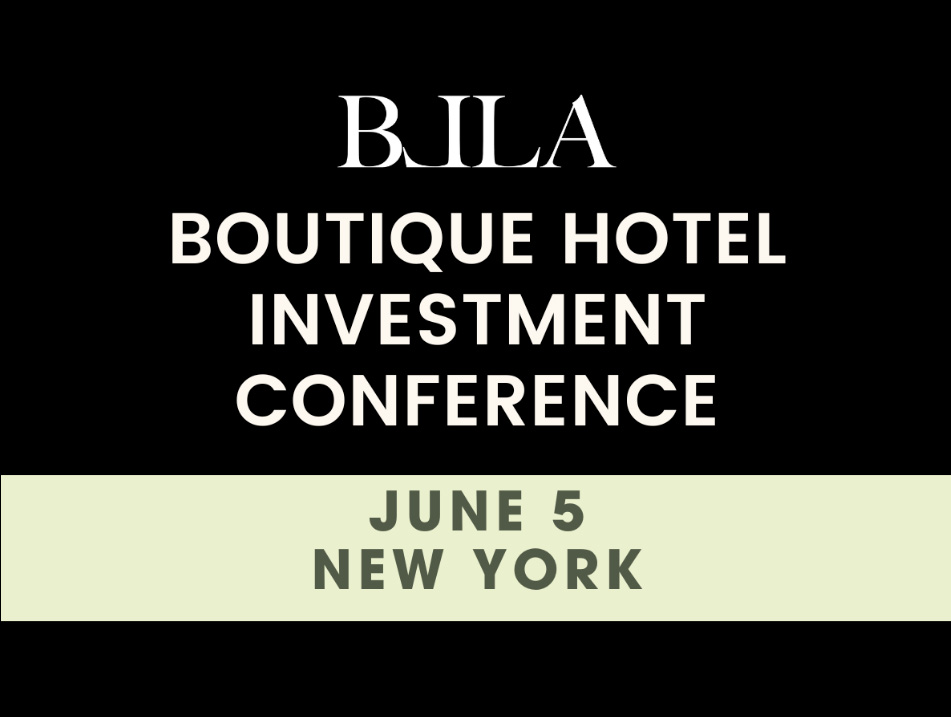Meet 2024 Boutique Hotel Investment Conference Facilitator: Marcus Lee

Meet 2024 Boutique Hotel Investment Conference Facilitator: Marcus Lee
Marcus Lee |
The BLLA Team sat down with Marcus Lee, Executive Vice President, Development at HVS Asset Management & Advisory to chat about the upcoming Boutique Hotel Investment Conference taking place on June 5 at Florence Gould Hall in NYC.
BLLA: As someone deeply involved in asset management and advisory services for the hospitality sector, what key trends do you see emerging in boutique hotel investment, particularly in terms of property improvement plans and brand/operator selection?
 ML: In an inflationary environment where owners are experiencing pressure from all angles, they are increasingly choosing to focus on Return on Investment (ROI). Through renovations, owners are focused on technological upgrades that help ease labor and utilities cost burdens. Notably, owners are increasingly investing in technologies such as automated check-ins, smart room controls, and AI-driven customer service platforms, which not only offer substantial labor savings but also enhance the guest experience by providing seamless, personalized interactions and greater convenience throughout their stay.
ML: In an inflationary environment where owners are experiencing pressure from all angles, they are increasingly choosing to focus on Return on Investment (ROI). Through renovations, owners are focused on technological upgrades that help ease labor and utilities cost burdens. Notably, owners are increasingly investing in technologies such as automated check-ins, smart room controls, and AI-driven customer service platforms, which not only offer substantial labor savings but also enhance the guest experience by providing seamless, personalized interactions and greater convenience throughout their stay.
With regard to selecting and appropriate operator or a soft brand for boutique hotels, owners and investors are increasingly focused on selecting an operating partner that will have a unique differentiating factor that complements their boutique hotel’s uniqueness in the marketplace. Preferred operators are those who are heavily involved in creating activations and a unique sense of place. With the increasing costs of operating a hotel, an owner’s bottom lines are constantly being pressured. Consequently, owners want operators and third-party asset managers to make prudent financial decisions that flow as much revenue as possible to the bottom line. Additionally, there are more and more owners seeking performance-based termination clauses in their management agreements to ensure that the management company’s interests are aligned with their own financial and operational goals long after a property stabilizes. This can be achieved through the expertise of a consultant who specializes in brand and operator search and selection.
BLLA: With your extensive experience in conducting feasibility studies and market analyses, how do you evaluate the potential success of a boutique hotel investment project, especially in dynamic markets like Los Angeles?
ML: Based on over 40 years’ experience conducting feasibility and market studies to assess hotel development projects, HVS has developed detailed financial models to project revenues, operating costs, and potential profitability. We evaluate three factors: market demand, occupancy potential, and ADR potential in a market in our analysis. We conduct a return-on-investment analysis, considering the developer’s initial investment, ongoing operational costs, and the expected return on investment. The equity yield (ROI) should fall within a range of reasonableness for an investor for the project to move forward.
BLLA: Could you share a memorable experience from your career where you successfully navigated challenges in asset management for boutique hotels, and what lessons did you learn from that experience?
ML: One memorable experience during my career in asset management occurred while overseeing a boutique hotel in the Pacific Northwest. In the absence of a national brand and its respective guidelines in place, we faced the challenge of transforming the staff’s understanding of their potential impact on revenue generation and expense management. It was crucial to reset expectations and educate the team on their critical contribution to profitability and the owner’s returns. Specifically, we encouraged the hotel to be more flexible with rates during the shoulder seasons to attract more corporate business. Typically, boutique hotels are hesitant to drop rates because the boutique model is predicated on high ADRs. However, to increase year-over-year revenues, a hotel has to take share. The experience at this boutique hotel reinforced the importance of continuous education and clear communication in achieving financial efficiency. We successfully instilled a proactive approach to operational management in this boutique setting.
BLLA: Given your role in valuations and your certification as a state-certified general appraiser, how do you assess the value of boutique hotel properties, and what factors do you consider most important in determining their worth?
ML: As is common for valuing income producing real estate assets, the Income Approach is utilized for valuing hotels, including boutique hotels. This could include a discounted cash flow analysis (DCF), income capitalization, or the room revenue multiplier analysis. The Income Approach method generally emphasizes the hotel’s ability to generate cash flow to the owner and is widely recognized by the lending community as the de facto method to valuing hotels.
DCF – This approach involves estimating the net operating income (NOI) the property is expected to generate over a period of time (for example over ten years), discounting this cash flow back to today’s dollars using an appropriate discount rate (a rate that reflects the investment’s risk).
Income Capitalization – This approach involves estimating a hotel’s net operating income (NOI) and applying a capitalization rate (based on market and investment risk) to determine a boutique hotel’s current value.
Room Revenue Multiplier (RRM) Analysis – typically used for rooms-only assets (or assets whose primary income is from rooms). An RRM multiplier is then applied to the hotel’s most recent revenues.
BLLA: With the hospitality industry evolving rapidly, how do you foresee boutique hotel investment strategies adapting to changing consumer preferences and market dynamics in the coming years?
ML: As the industry evolves, boutique hotel investment strategies are likely to adapt by focusing more on creating personalized guest experiences and integrating technology to meet changing consumer preferences. Investors will increasingly prioritize properties that offer unique, localized experiences and sustainable practices. Investors will also increasingly lean into active asset management and data analytics to fine-tune operations, costs, marketing and to monitor the effectiveness of an operator on an owner’s behalf. Data-driven, targeted marketing will ensure that each boutique hotel not only stands out in a crowded marketplace, but also closely aligns with the latest trends.
BLLA: Why are you excited to attend the Boutique Hotel Investment Conference?
ML: I am excited to attend the Boutique Hotel Investment conference because it’s a pivotal event for connecting with industry leaders and gaining insights into the unique challenges and opportunities within the boutique hotel market. It’s an excellent platform for networking and learning from successful entrepreneurs and experts who are shaping the future of boutique hospitality.
Come see Marcus Lee speak on a panel we call “Key Valuation and Capital Market Trends” alongside Joe Levine of Mercer Street Partners on June 5 at Florence Gould Hall in NYC!
Register for your tickets today!
About HVS
HVS, the world's leading consulting and services organization focused on the hotel, mixed-use, shared ownership, gaming, and leisure industries, was established in 1980. The company performs 4,500+ assignments each year for hotel and real estate owners, operators, investors, banks and developers worldwide. HVS principals are regarded as the leading experts in their respective regions of the globe. Through a network of some 60 offices and more than 300 professionals, HVS provides an unparalleled range of complementary services for the hospitality industry. hvs.com.
Meet 2024 Boutique Hotel Investment Conference Facilitator: Ben Weinberg
Meet 2024 Boutique Hotel Investment Conference Facilitator: Ben Rafter
Click here to view the original version of this article.
Boutique Lifestyle Leaders Association (BLLA)
Email: info@blla.org
HVS
https://www.hvs.com/
1400 Old Country Road, Suite 105N
USA - Westbury, NY 11590
Phone: +1 (516) 248-8828
Fax: +1 (516) 742-3059
Houston Hotel Submarket Performance: Nominal Gains and Real-Dollar Context | By Bunmi Oyinloye
HVS Asia Pacific Hospitality Newsletter - Week Ending 12 December 2025
2025 HVS Middle East & Africa Hotel Valuation Index

